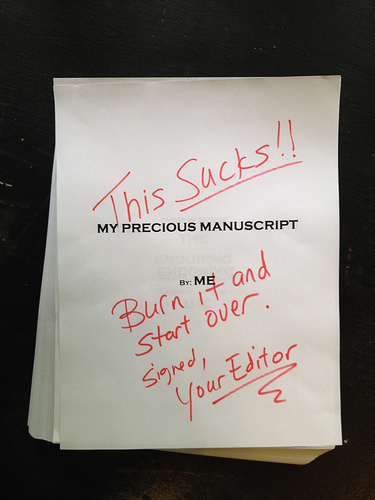When Your Beta Reader/Editor Says Your Book Sucks (aka, lessons learned)
I sent my third book (not the third book I’ve ever written, but the third book I’m looking to publish) to my best friend and beta reader about two weeks ago. Last week, she asked me, “How brutal can I get?” I’m pretty sure this was code for, “Your book sucks.”
This led me to a very important lesson.

LMRitchie | WANA Commons
For those of you who have been following my writing journey, you know it hasn’t been without its ups and downs. As a writer, I sometimes struggle with storytelling and always struggle with wanting to be discovered by readers. I also know how important it is to keep getting better at the craft. To write and write and write, and to study and learn and write some more, always trying to improve.
For this third book, I wanted to shake things up. I had a method for writing that has always worked for me. I’d write a chapter, edit, revise, reread, and revise some more until I was comfortable that chapter was as close to good as it could get. Then I’d move on to the next chapter and do the same thing (this is known as being a write-itor). The result? A pretty damned solid first draft. It took longer to finish a book that way, but I always had an ongoing sense of the plotholes and details that still needed closure by book’s end (very important when you’re writing suspense!).
So yeah. About shaking things up. See, when I started writing the third book I’d been hearing a lot about how a writer needs to just write. To get his or her thoughts onto the page and just keep going until they got to the end. And then, go back and revise, revise, revise. So I thought, yeah, I could see the merit in that. I mean, it’s all about the creativity, right?

LMRitchie | WANA Commons
When I started writing a gazillion years ago (seventeen years, to be exact), I used to write longhand in a notebook. It was a very liberating experience because I just let the images come to mind and then they’d flow out onto the paper. I loved the feel of the paper and pen in my hand and though it was painstaking work (for both my fingers and the length of the process), it was enjoyable. Fast forward those seventeen years and the start of book three, and I got to thinking maybe I should try that again. Let the old creative juices flow through a pen and paper, and just write, write, write and then type it into the computer and then revise, revise, revise.
Well, guess what?
Yep. The dreaded five words from my beta reader: How brutal can I get?
Sob.
Ouch.
Time to break out the vodka.
You know, the whole writing-longhand-in-a-notebook-experience, without looking back and just letting the story flow, really is liberating. Problem is, it’s too liberating. As much as I thought I had a sense of storyline, and theme, and characterizations and conflict and red herrings and driving suspense along the way…well, I didn’t.

LMRitchie | WANA Commons
So yeah, here I am looking back at the past six months it took me to write that book and I’m thinking, oh boy. I see a major rewrite coming. And guess what? I’ll be doing it as a write-itor again, on my laptop, one chapter at a time, writing until I’m comfortable and certain that chapter is as good as it can get. And only then will I move onto the next. And I can guarantee you I’ll be doing the same thing for book four and every book after that.
It was a valuable and hard lesson learned, and one I hope every writer out there takes to heart:
Write in the way that works best for you and dismiss the advice everyone else tries to pass on. They have no clue how you tick.
Copyright © 2012-2014 · All Rights Reserved · TerriPonce.com
Filed under: Stories Behind The Stories Tagged: beta reader, editing, editor, fiction, write-itor, writing, writing fiction, writing longhand











